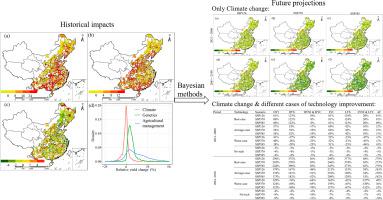Agricultural Systems ( IF 6.1 ) Pub Date : 2022-09-22 , DOI: 10.1016/j.agsy.2022.103522 Shibo Guo , Zhentao Zhang , Erjing Guo , Zhenzhen Fu , Jingjin Gong , Xiaoguang Yang

|
CONTEXT
Increasing soybean yield is essential for China. In order to secure the desire soybean yield gains, it is important to understand how changes in climate and technology impact soybean yield.
OBJECTIVE
First, we used historical climate and specific technology data assessed the impact of historical climate and technology on soybean yield in China. Second, combined with the historical yield linear trends, we projected future soybean yield under climate change and technology improvement.
METHODS
We collected the historical climate data (daily maximum and minimum temperatures, precipitation, and solar radiation) and actual crop data (soybean yield and agricultural management practices: sowing date, total agricultural machinery, effective irrigation area, pesticide application amount, and rural labor force) of 1312 soybean-growing counties in China from 1990 to 2017. Besides, we calibrated and validated the vegetative and reproductive stages, and the yield formation process genetic parameters of soybean of different maturity groups in DSSAT-CROPGRO-Soybean model by a five-year cycle based on soybean field experiment data. We defined agricultural management practices and genetic parameters as technology, and used Bayesian methods to conduct an impact assessment of historical climate and technology changes on soybean yield. We also projected soybean yield from 2021 to 2100 under climate change and different cases of technology improvement.
RESULTS AND CONCLUSIONS
From 1990 to 2017, more than 90% of the study counties showed an increase in soybean yield, although the yield increase slowed down after 2010. Agricultural management practices and genetic parameters changes increased soybean yield by 16% (−24 to 50%) and 6% (−14 to 24%), respectively, while climate change decreased soybean yield by 1% (−14 to 18%). The positive impacts of agricultural management practices were mainly attributed to pesticide application amount and total agricultural machinery. With changes in agricultural management practices alone, soybean yield showed a plateau or even a decrease after 2010. If the technology remains at the level it was in 2010s, soybean yield would decrease in the future in 49% of the counties.
SIGNIFICANCE
Based on climate, soybean yield, specific agricultural management practices and genetic parameters data, we quantified the impacts of historical climate and technology on soybean yield in China. Besides, we projected future soybean yield under climate change and different cases of technology improvement, and discussed possible solutions for future increasing soybean yield. This work has practical significance for understanding climate and technology impacts on soybean yield, and implementing countermeasures to address future climate change and increase yield.











































 京公网安备 11010802027423号
京公网安备 11010802027423号